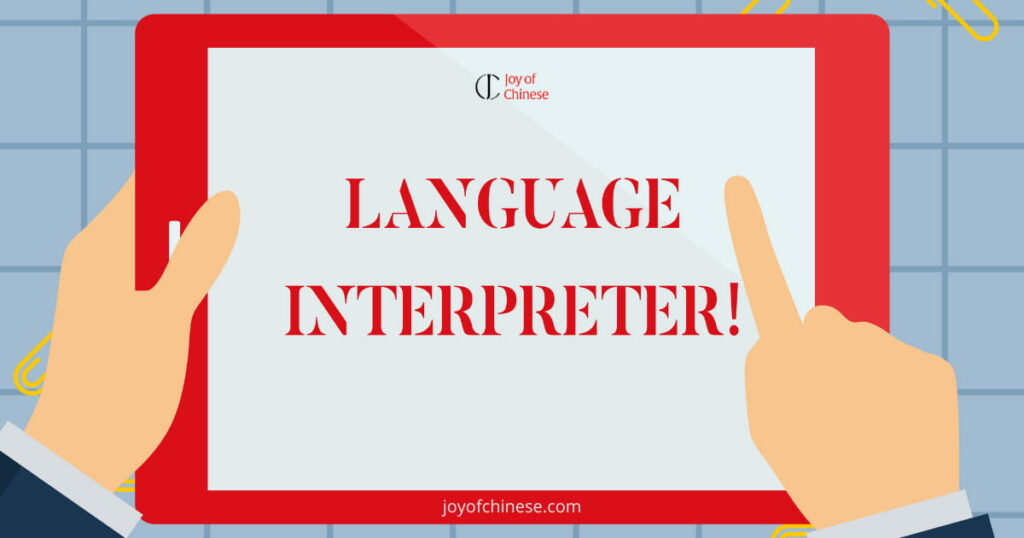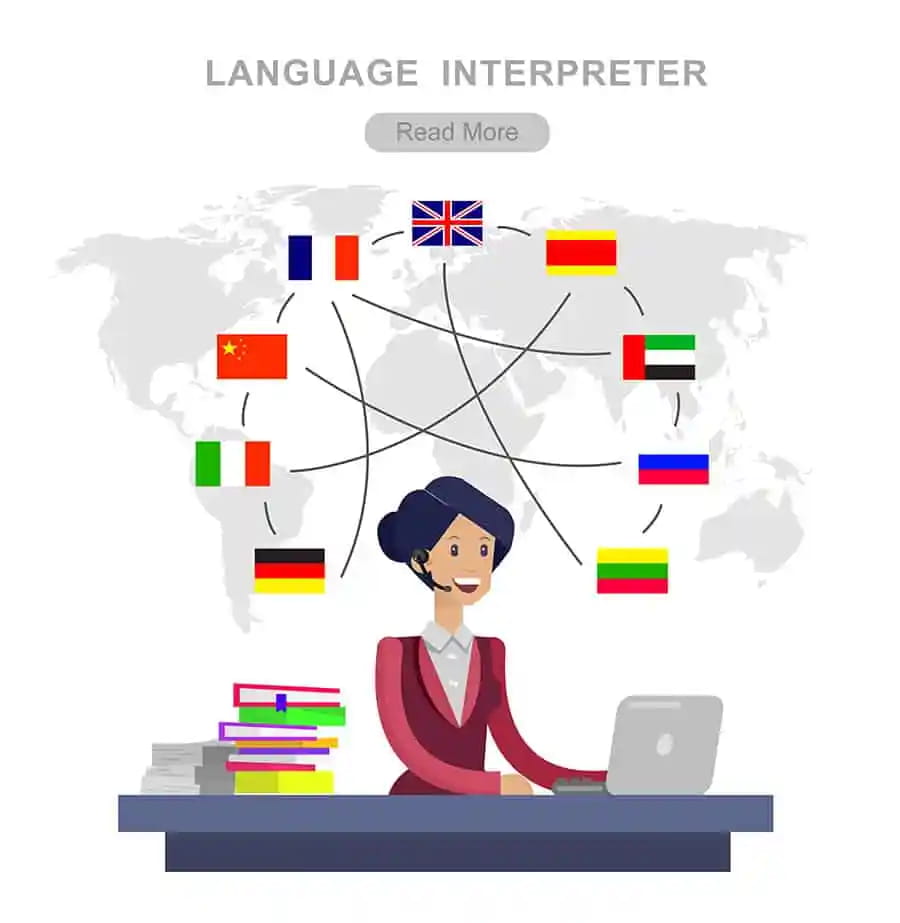Interpreting is one of the most sought-after careers that require Mandarin.
It makes sense, right?
Mandarin is one of the most widely spoken languages in the world, with over 1 billion speakers.
China’s flourishing economy, cultural aspects, politics, the upward trend of international business, and entertainment content popularity are the benefits of learning Mandarin.
Making a career in interpretation can be a rewarding and challenging career path for those passionate about language and culture.
Today, there is a growing range of job opportunities for those with Mandarin skills. You can earn high earnings. That is why an increasing number of people are interested in studying Chinese.
If you want to learn Chinese to become a Mandarin interpreter, you have come to the right place.
Discover everything you need to know about a career in this field in this ultimate guide. I have discussed various elements in this article, such as job types, requirements, prospects, salaries, advantages, and disadvantages.
It’s time to get started!
TABLE OF CONTENTS
- What is the job of a Chinese interpreter?
- How does an interpreter differ from a translator?
- Various types of Chinese interpretation jobs
- (i) Simultaneous interpretation
- (ii) Consecutive interpretation
- (iii) Chuchotage or Whispered interpretation
- (iv) Telephone Interpreting (Over-the-Phone / OPI)
- (v) Travel interpretation
- (vi) Bidule interpretation
- (vii) Liaison interpreting
- (viii) Relay interpretation
- (ix) Business or Negotiation interpretation
- Benefits of a Chinese interpreter
- Disadvantages of Mandarin Interpretations
- What are the requirements to become an interpreter?
- How long does it take to become an interpreter?
- What is the salary of a Chinese interpreter?
- What are the job opportunities, and where to find them?
- Final thoughts on a career in Chinese interpretation

What is the job of a Chinese interpreter?
Mandarin interpreters with excellent speaking skills always work in real-time. They aim to facilitate communication between native Chinese speakers and non-Chinese speakers.
It is their’s responsibility to ensure that the intent of the original message is conveyed accurately. It also pays attention to cultural nuances and etiquette errors.
They work in various ways depending on the setting, surroundings, and setup. A government body, an international association, a private company, an agency, or a freelancer are all among them.
It is also essential that the applicants have a decent understanding of the target language and a higher proficiency in Mandarin. Speaking clearly, interpreting well, and being confident is also imperative.
It is not uncommon for them to specialize in a particular industry or to have specialized knowledge. Examples include legal, IT, medical, finance, scientific, and engineering.
Taking on the role will allow you to travel and gain a more profound familiarity with cultures. Besides exploring the local foods, arts, history, music, and festivals, you can also find out everything there is to know about the Chinese region.
Your customers will come from various industries, businesses, and fields. There are also opportunities for freelancers, whether they work full-time or part-time.
Translating conversational content into another language is what you do. For example, you can create television and internet subtitles using online interpretation tools.
How does an interpreter differ from a translator?
A professional interpreter translates spoken language between the source and target languages in real time.
On the other hand, Chinese translators must translate written texts between languages.
Translation involves writing, whereas interpretation involves spoken communication.
It is vital to be fluent in two languages to interpret effectively. Plus, near-real-time thinking and communication are also crucial.
Translating can be done slowly and using other sources and materials to assist. Your target language proficiency isn’t required since the work isn’t instant. This makes it easier than interpretation.
Interpreting between two or more people can be challenging and fast-paced. Despite this, translation and interpretation require identical skills, which need more sophistication.
Various types of Chinese interpretation jobs
The ways and scope of interpretation have changed constantly. As a result, the needs of organizations also vary.
Today, works are interpreted in a variety of ways. The following are the 9 most common types of Chinese interpreters.

(i) Simultaneous interpretation
Events with many attendees, such as meetings, conferences, and training sessions, use this system. Real-time translation occurs as the speaker listens and comprehends.
This is still not live due to a few seconds of delay. A correctly interpreted text can only be understood once the interpreter fully understands it.
The nature of this work makes it challenging and decisive to interpret. As a result, they are always alert and active throughout the project.
The speaker can lose a few words or even the whole idea or sentence if there is a delay. Carelessness or incompetence is unacceptable.
(ii) Consecutive interpretation
A back-and-forth style of interpreting is the second. An example is a short-duration news conference, court case, or business meeting.
An interpreter stands near the presenter and provides consecutive interpretations. It is common for the speaker to stop speaking in their native language after every few minutes.
A topic, opinion, or paragraph will usually end with this sentence. They listen silently for a few sentences and then repeat what they hear in the target language.
Note-taking is required for this type of interpretation. It is rare for a person to memorize an entire paragraph without losing details in one hearing.
(iii) Chuchotage or Whispered interpretation
During whispered interpreting, the interpreter listens to and analyzes the message before whispering it to the client. Then, they convey the message in the client’s preferred language.
The level of difficulty and intensity of chuchotage is the same as that of simultaneous. Interpreters hear, understand, translate, and deliver speeches concurrently in the target language.
Due to the nature of the work and the low voice, this is suitable for smaller meetings with fewer participants. Therefore, this method will not work for large-scale events like conferences.
(iv) Telephone Interpreting (Over-the-Phone / OPI)
There are two types of scheduled interpreting: simultaneous and consecutive. The appointment is conducted by telephone interpretation instead of in person.
When participants are okay with hearing only the interpreter’s voice, simultaneous telephone interpretation can be conducted. However, it is preferable to arrange it back-to-back as an alternative.
This has its shortcomings. Because they cannot see speakers or their bodies, they need to be more accurate. They cannot discern meaning and context from non-linguistic clues.
(v) Travel interpretation
As with tour guides, interpreters must be fluent, accurate, and culturally aware.
By escorting tourists and customers who have language barriers, they help them reach their destinations. Besides language skills, a client’s whereabouts and local customs must be fully understood.
Being a traveling interpreter requires more than just interpretation skills. It can book a taxi or hotel, order food, and close multi-million dollar deals.
(vi) Bidule interpretation
A portable receiver and transmitter are included in the Bidule interpreting system. A cabin is not required for simultaneous translation when using this method.
Through a microphone, the transmitter translates the words spoken by speakers into another language. Audience members use headphones to listen to the translation.
Small groups, tours, and informal occasions, such as corporate retreats and seminars, are the best fit for the service. There is no need for specialized technicians to use or carry it. The price is also reasonable.
(vii) Liaison interpreting
Interpretation in this mode does not require note-taking, and communication occurs in both directions. It is a standard method as well.
An interpreter who works as a liaison interprets between people or organizations informally. This technique is less accurate than consecutive, and word-to-word interpretation is unnecessary.
(viii) Relay interpretation
Relay interpretation is best when no interpreter is available for a particular language pair. This type of service provides multi-interpretation services.
E.g., you may need a Dutch-to-Norwegian translation. But because of the need for a Norwegian interpreter who is less commonly spoken, you will use a popular language like English. So, we will have Dutch to English to Norwegian as a final result.
This is more time-consuming and expensive. However, when no interpreter exists in a particular language pair, this is the only way to complete the critical task.
(ix) Business or Negotiation interpretation
In commercial negotiations, negotiation interpretation should promote communication. If one is precise and responsible, this works well in small groups.
An interpreter with experience in such discussions is suggested. They also need to have the skills and time to prepare.
Benefits of a Chinese interpreter
The benefits of learning Mandarin for working as an interpreter are countless. Among them are:

(i) A sizeable Chinese-speaking market
Mandarin is the most widely spoken native language globally, followed by English, Hindi, and Spanish. It is also the second most spoken, most widespread Asian language and the second most used language on the internet.
Nearly 1 billion people speak Chinese in China alone. However, Chinese is also spoken in many other parts of the world, including by a vast number of diasporas.
There is also a boom in the economy of Chinese-speaking countries. There are various sectors in which it excels.
China’s most thriving industries are automotive, manufacturing, electronics, textiles, and mining.
With a vast Chinese-speaking population, many opportunities are available. Native Mandarin speakers and non-Mandarin speakers can communicate more effectively with it.
Communication in a variety of backgrounds becomes more practical. Meetings with doctors, lawyers, and business people, for instance.
Even in highly specialized fields, Chinese interpreters have many job options. It is true that some jobs require a high level of effort and have varying demands. However, the pay is decent, and they are highly rewarding.
Using Mandarin interpreters to promote understanding can contribute to bridging cultural differences.
(ii) An increase in the demand for interpreters
Interpreters are in high demand because of the growth of the Chinese economy and its global influence.
As Chinese-speaking countries expand into international markets, their trade extends beyond national borders. There are many benefits of studying in China, and this is one of them.
Foreigners also need them to reach the Chinese-speaking market. Only a few Chinese-speaking people work in this field, which makes it even better. The reasons behind this are twofold.
There is a lower level of English understanding among Chinese speakers than in the rest of the world.
Because most documents have already been translated from Chinese to English, it is imperative to have personnel capable of translating articles into their native languages.
Most Mandarin speakers need help with their Chinese dialect and accent when speaking English.
Foreigners are more likely to sound Chinese when they practice enough. The demand for interpretation services is, therefore, higher among foreigners.
Health care, law, technology, and trade are among the many fields in which interpreters are in high demand. Besides, with global communication and travel growth, interpreters will also be in greater need.
(iii) Expand your horizons
When you learn a new language, you better understand the human condition. Thus, an interpreter must understand the source and target languages and the country where they are spoken to perform well.
Translators, interpreters, and localizers understand the cultures involved deeply, enabling them to guide the project through the most complex aspects.
It encourages them to produce authentic and impressive results.
They learn not always by themselves and work. Linguists can build relationships with other experts and improve their skills by attending conferences, international events, and courses.
(iv) Flexibility
Chinese interpreters have a wide range of career options.
They have many employment options. With internet technology, one’s professional world is no longer limited to one’s city, state, region, or nation.
Besides working full-time, working part-time for various organizations is possible. An excellent place to start is to explore freelance employment opportunities.
(v) The pay of Chinese interpreters is good
There are many benefits associated with Mandarin interpreting, including good salaries and incentives. These designations are usually awarded to professionals with significant experience.
Earning potential can vary from job to job. Several factors need to be considered. The industry, references, domain-specific knowledge, locations, and experience can all be considered.
A Mandarin interpreter’s average salary is higher than other language-related careers. Sometimes, those with more experience or specialized knowledge earn more money.
Many of them work as freelancers instead of full-time employees. Most of the time, employees are paid hourly or on a project basis. This gives them greater flexibility and higher wages. Yet, they are at a greater risk of job instability in those circumstances.
Disadvantages of Mandarin Interpretations
There are some drawbacks associated with Chinese interpreters, as with everything else. Some of them are listed below.

(i) Insufficient subject expertise
Depending on their field, they may require more law, medicine, technology, or engineering knowledge. Misinterpretations and inaccuracies may result from this.
It is necessary to have experience in a particular industry or field of knowledge. Also, specific wisdom is often needed to define objectives and priorities correctly within a project.
There is more to this than Chinese songs; some may see it as a dream come true. Besides knowing about politics, history, and technology, you should also be knowledgeable about other fields.
Contextual considerations are usually crucial. For example, China and other Chinese-speaking countries have a rich and diverse culture. However, interpreters may need to help understand it. As a result, misunderstandings can occur.
For high-quality interpretation services, it is essential to understand a specific trade, market, and field. Skilled interpreters earn good salaries and are highly sought after.
(ii) Fluency in Mandarin is required
To become fluent in Mandarin, learners must gain tremendous knowledge.
Chinese is difficult; you need advanced abilities like TOCFL or HSK level 6. On the other hand, success is tough at intermediate levels, such as levels 3 or 4.
The study, learning, and research you look forward to continuing. It’s crucial to stay up-to-date with news in the Chinese-speaking world and study Chinese throughout your career.
Conveying emotions and languages in various Chinese dialects takes a lot of work.
For some, conveying sound and feeling is challenging when interpreting spoken languages. Likewise, understanding and sharing nonverbal signs, such as body language and facial expressions, is complicated.
(iii) Interpreting is a tiring job
In this job, complete concentration is required at all times. You must also read and understand the work, the field, and the purpose for hours and days.
The most common side effects are stress and mental exhaustion. This task requires constant listening, understanding, and communicating of information.
It is also possible to work long hours, often in high-pressure or stressful situations, which can lead to mental and physical exhaustion. Plus, long periods of interpreting can cause misunderstandings or inaccurate information.
It is also possible for professional interpreters to need support to interpret subjects that are sensitive, unclear, or complex.
(iv) Interpreting jobs are usually unstable
Interpreters’ jobs can be affected by many factors. For example, in some professions, such as government or large corporations, they are more stable and offer more uniform work.
Employment may be less stable in other areas, such as the freelance or contract sector. This field is typical and expected to have long periods of no work.
It is often difficult for freelancers to find regular work, and they are constantly looking for new clients and work. Plus, a lack of extra benefits and perks may further complicate things for them.
A job’s stability can vary widely depending on its type and industry. So, exploring the job market and potential employers is a wise first step before pursuing an interpreter career.
What are the requirements to become an interpreter?
To succeed as a Chinese interpreter, you must meet a few requirements. Here are a few of the most important.

1. A fluent speaker of Mandarin and another language
To become a Chinese interpreter, you must be fluent in Mandarin and another language (such as English or your native tongue). Speaking, reading, and writing are both languages that are essential professionally.
It is necessary to have skills above the intermediate level. You can join an offline or online Mandarin course at a university, private institute, or through a tutor who offers long-term Mandarin classes.
It is best to immerse yourself in Chinese to improve your language abilities. Thus, you can watch movies and TV series, listen to songs, and download apps to learn Chinese.
Immersion, engagement, and exchange are ways to enhance your language skills.
In most situations, translating, interpreting, thinking, and communicating on the spot is usually necessary. Since you will speak almost like a native speaker, you must also have excellent Chinese skills.
Some official or recognized institutions require the certification of interpreters by some organizations. A university diploma, degree, or international certificate like HSK or TOCFL can improve employment prospects.
2. Domain-specific experience
It is usually necessary for interpreters to have previous experience in the same field before being hired. Hence, internships provide excellent opportunities for gaining work experience.
Putting your knowledge into practice through paid or unpaid internships at some companies is possible.
Gaining experience through volunteer work is another option. Even if you aren’t paid, you will gain valuable experience.
3. Knowledge of culture and expertise in a particular field
Besides language and interpretation skills, it’s essential to have a deep understanding of Chinese culture and customs. This includes knowledge of Chinese history, traditions, manners, practices, and social norms.
Understanding the cultural context of a conversation or event can significantly enhance your ability to interpret accurately and effectively. This is when translating languages and cultures that differ from one’s own.
There are podcasts, music, and songs available to listen to. One can also watch films, documentaries, and TV shows to improve Chinese.
Comprehending field-specific information, such as healthcare, law, and business, is vital when interpreting. And by doing so, miscommunications are prevented.
Having a basic understanding of Chinese customs and traditions is helpful.
E.g., Mandarin movies for learners can be beneficial. As well as negotiating social settings more effectively, you can perform on-site work more efficiently.
4. Interpretation skills and professionalism
Interpretation is a specialized skill that needs training and practice. There are two main types of interpretation: consecutive and simultaneous.
Consecutive involves listening to a speaker and translating their words into another language. In contrast, simultaneous comprises solving the speaker’s words in real-time as they are speaking.
You can gain interpretation skills by taking courses in interpretation, attending workshops and conferences, and practicing with other interpreters.
Tone and emotion must be conveyed when interpreting. Thus, besides providing nonverbal communication, it accurately represents idiomatic expressions.
Professionalism and reliability are essential, as well as maintaining confidentiality.
You are likely aware of many modern technologies. For instance, remote interpreting, telephonic interpretation, and videoconferencing are all tools powered by artificial intelligence.
It is crucial to know how to use Chinese materials. Time and effort are required to develop the research skills for translation.
Further, you’ll benefit from time-management skills, patience, active listening, and patience. Finally, you must possess confidence, self-motivation, adaptability, and honesty.
The first thing you should do after completing professional work is to find out what you don’t know.
There are many settings in which interpreters can work. Sometimes, they must adapt based on their subject, the environment, and the culture. Physical and mental health should be good for candidates.
5. Get certification
Certification is not mandatory to become a Mandarin Chinese interpreter but can enhance your credibility and job prospects.
Several organizations offer certification for interpreters, including private institutions, universities, and government bodies.
To become certified, you must pass an exam that tests your Mandarin language and interpretation skills. For example, college-level, HSK, and TOCFL exams.
6. Gain experience
Experience is crucial to becoming a successful Chinese interpreter. You can gain experience by volunteering at local events or organizations, attending job fairs, and networking with other professionals.
You can also gain experience by working in the interpretation field in various settings, such as healthcare, legal, and business.
How long does it take to become an interpreter?
The first and most crucial step to becoming a Chinese interpreter is to learn the language. Mandarin is a complex language with a different writing system and pronunciation than English.
To thrive in this profession, you need a near-native level of Mandarin. It takes many years of practice and dedicated study to achieve this goal.
Many factors determine how long it takes to learn Chinese. For example, your approach, learning style, mother tongue, dedication, and time invested can all affect the duration.
According to the FSI (Foreign Service Institute of the USA) research, Mandarin is “exceptionally difficult for native English speakers.” To restate, it is among the super-hard languages to learn.
They estimate 2200 hours to become fluent in Mandarin. The total study time increases to 4400 hours once we add 1:1 classroom sessions and self-study.
Achieving advanced abilities at the Mandarin HSK level V typically takes 3 years. Apart from working as an interpreter, you can earn bachelor’s and master’s degrees in Mandarin from a university.
You can take classes at a language school or university for professional training and certification.
You can also use online resources and Chinese learning apps to practice speaking, listening, reading, and writing daily to improve your skills. So, it is vital to maintain current skills, continuing education, and practice.
You can start a career as a Chinese interpreter once you achieve advanced fluency, which is nearly native.
Besides your Chinese skills, you should also be proficient in English, your native tongue, or another language. Knowing the cultures and industries they will translate will also be helpful.
What is the salary of a Chinese interpreter?
There can be a difference in the pay of a Chinese interpreter. Many factors determine the industry, the profile, the location, and the level of experience.
PayScale says Mandarin interpreters in the United States earn an average of $54,000 yearly. But, depending on the company, it can range from $42,000 to $950,000 annually.
This figure may be higher or lower depending on your industry. For example, medical, legal, and technical specialists may earn more than general ones.
Your experience and where you live will determine how much money you can earn.
Specialized Chinese interpreters might make more, for example.
HSK level VI or MA Chinese holders with industrial experience (mainly software) for interpreting in India generally earn around 75K to 100K monthly.
A fresher with HSK level V certification can expect to earn about 40-50k as a starting salary. It’s more than just software. The more experience and fluency you have, the closer you can get to a seven-figure income like HSK level VI.
An interpreter in China typically earns between €40,000 and €60,000 per year.
What are the job opportunities, and where to find them?
At a higher level of language proficiency, start looking into opportunities as a Chinese interpreter.
There are many options available to you. Besides contacting companies and job portals, you can also join interpreted communities. All can participate in virtual meetings here.
You can discuss career opportunities, career paths, and related topics.

(i) Governments and international organizations
Interpreters are needed in the government to attend meetings and interpret papers. Interacting and building relationships with nations worldwide is the aim.
There are many reasons the government hires them. For example, translating documents or audio recordings may be part of such a job. You can also take part in meetings and events.
There are also many local, national, and international organizations. Examples include UN employment, diplomatic missions, consulates, and other international and commercial organizations.
(ii) Chinese companies and the private sector
You can work for many Chinese companies around the world. Also, job portals and networking sites, such as LinkedIn, are available.
There are a variety of small and large commercial and industrial enterprises to choose from. Also, many multinational companies have operations in China or deal with Chinese-speaking countries.
When offering products and services outside the company, someone must be able to interpret paperwork.
It is a vast industry. People who handle interpretation are part of the company’s human resources. In addition, third-party agencies may be hired to do their work.
(iii) Interpreting agencies and businesses
As a Mandarin Chinese interpreter, you can work in various settings, from conferences and business meetings to legal proceedings and healthcare appointments.
Consider applying for this position if you have experience. Like the rest of the world, Chinese speakers appreciate the freedom of freelancers. Today, this type of employee is highly sought after.
There is a great need for various interpretation positions in China and elsewhere. This is because a great deal of commerce moves in and out of the country.
(iv) Freelance
This position is ideal for experienced interpreters. Freelancers are appreciated by Chinese speakers just as much as anywhere else. Therefore, these types of employees are in high demand today.
They are always in demand by many firms. However, despite this, hiring candidates could also be less competitive and simple because of the more complex language.
(v) Academic centers and events
Develop your skills as an interpreter by volunteering. Chinese-related events, film festivals, painting festivals, and music festivals are some of the best places to do this.
Even though you won’t get paid, you’ll gain more real-world experience than attending meetings.
The university’s Chinese department or language school can assist you if you need interpreters. Then, you can get yourself out there if you feel ready and your teachers agree.
(vi) Chinese-speaking regions
Chinese businesses always look for talented foreign employees because of the high demand. As a result, several countries have collaborated with it or signed memorandums of understanding.
Foreign employees may work in China because of the association. Thus, specific methods can reduce the costs of an operation of this type.
There are so many incredible things to do in China. First, however, you’ll need to pass a Mandarin language proficiency test at the highest level possible for your chances to increase.
Several initiatives recruit native English speakers to teach English throughout Asia. English is the primary language used as an interpreter in China, for instance, or teaching English in China.
This is a once-in-a-lifetime opportunity to immerse yourself in a foreign language and gain invaluable experience.
Final thoughts on a career in Chinese interpretation

Working as a Chinese interpreter requires fluency in Mandarin and understanding of daily situations. Another language like English, or your mother tongue, if in demand, will also be necessary.
An excellent ability to read, write, speak, and listen is also helpful. Legal and formal matters could also be involved in the work. Thus, studying the standard form found in textbooks is beneficial.
You also need interpretation skills, cultural understanding, certification, and experience. Dedication and hard work can make you successful and contribute to bridging the gap between cultures and languages.
You can study with the help of a teacher or a learning center. You can also benefit from audio, video lessons, podcasts for Chinese learning, books, and apps.
You will have a lot of opportunities and benefits for your career and personal development. It will be a profitable job prospect since it is highly sought-after and well-paid.
It is a long journey to become a Chinese interpreter. There will be a learning curve, and you won’t see results quickly. But it’s well worth it! If you work hard and plan carefully, you can make your dreams come true!
Take advantage of this incredible chance to learn Mandarin, speak fluently, and advance your career as a Mandarin interpreter.
I hope you enjoyed it. If you want to share your thoughts or ask questions, comment below.











